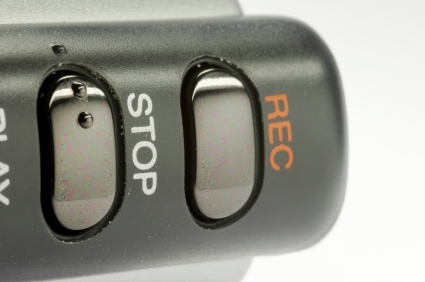The Case For Recording Interviews With Reporters
If you thought the New York City mayoral race would get more civil as Anthony Weiner started sinking in the polls and heading toward what will hopefully be a life of J.D. Salinger-like obscurity, you’re wrong.
Two other leading Democratic contenders—Christine Quinn and Bill de Blasio—have created plenty of their own drama with a recent kerfuffle over a media misquote
The trouble began when The New York Times star columnist Maureen Dowd mangled a quote from de Blasio’s wife, Chirlane McCray, who was speaking about her husband’s opponent, Ms. Quinn.

New York City mayoral candidate Christine Quinn
Here’s how Ms. Dowd quoted Ms. McCray in her story:
“She’s not accessible,” McCray says. “She’s not the kind of person I feel I can go up to and talk to about issues like taking care of children at a young age and paid sick leave.”
That quote was particularly edgy, since it could be interpreted as a smear against Ms. Quinn, who is a lesbian without children. Ms. Quinn blasted Ms. McCray’s statement.
But it’s not actually what McCray said. She was misquoted.
It turns out that Bill de Blasio’s campaign had recorded the interview. They released the audio of the relevant portion, which shows that the comments were made in a slightly broader context. (Maureen Dowd later blamed the noise in the café and a lousy tape recorder for her fumble; The New York Times issued a lengthy correction.)
“Well, I’m a woman, and she’s not speaking to the issues that I care about, and I think a lot of women feel the same way. I don’t see her speaking to the concerns of women who have to take care of children at a young age or send them to school and after school, paid sick days, issues in the workplace — she’s not speaking to any of those issues. What can I say? And she’s not accessible, she’s not the kind of person that I feel that I can go up and talk to and have a conversation with about those things, and I suspect that other women feel the same thing that I’m feeling.”
My New Advice About Recording Interviews with Reporters
In this case, the difference between the two quotes wasn’t terribly dramatic. But it could have been—and had Mr. de Blasio’s campaign not recorded this interview independently, his cries of “My wife was misquoted!” would have likely fallen on deaf ears.
I’ve previously written that you shouldn’t record your interviews with reporters except for the most challenging situations, since doing so can lead to a climate of mistrust and suspicion before you even begin speaking. I’d continue to stand by that advice for “everyday” interviews—those that don’t hold your company’s, organization’s, or campaign’s reputation in the balance.
But my thinking has evolved on this issue, and I’d now advise spokespersons for political campaigns, businesses dealing with controversial issues, and those dealing with unfriendly media—among others—to consider recording their raw interviews with reporters. That’s not just because reporters occasionally seek a “gotcha” moment, but because even journalists of full integrity can make honest mistakes. And if they do, your recording may be your only evidence that you were wronged.
Without that evidence, it’s easy to see how a single misquote could be all it takes to destroy your candidacy, your company’s stock price, or your reputation.
One final point: Some states require two-party notification. If you’re recording your interviews over the phone, check the laws in your state. To help preserve your long-term relationship with reporters, you should probably tell them you’re recording regardless of the state law.
What do you think? Do you ever record raw copies of your media interviews? We’d love to hear from you.




I’ve been involved in a situation where I recorded an array of interviews with two particular reporters from the same outlet (after a very long and contentious history). They didn’t like it one bit. They mocked us, ridiculed us and even threatened an intellectual property-based lawsuit when the recordings (and the questions we’d made them submit in writing, along with our written answers) were made public on the web. Nothing ever came about legally, but their point was made. We can record you…but we don’t like you recording us.
I share this to say…brace yourself if you ever find yourself in a position to do this. I agree with Brad’s thinking on this and admire his candor in admitting that his opinion on the subject has evolved. But when this option is most likely to be in play, relations might very well already be strained. Employing this tactic will probably strain them more. Again, just be prepared.
Adam,
Wow – it’s seems that you’ve been through some real media fires. I’d love to hear more about the circumstances that led to that strained relationship. I suspect it’s industry-specific, that the news organization didn’t trust your company?
I’ve never heard of a news organization threatening a lawsuit for releasing legally recorded raw material before. That’s not to say it doesn’t happen, but I suspect it’s rather unusual. So, a question to other readers and journalists: Have you heard of lawsuits, threatened or real, as a result of taping and releasing a raw interview?
My suspicion is that journalists reporting on politicians, controversial celebrities, and Fortune 500s are rather used to being recorded.
I still don’t think recording raw interviews is a great idea for every interview spokespersons ever give. But I’m more inclined to agree with clients who want to record their interviews than I used to be.
Thanks for your comment!
Brad
I just heard a wonderful quote from Tavis Smiley about a lot of mainstream media outlets love STORY telling but not necessarily TRUTH telling.
I’d also like to suggest a recording tool that may help to not draw so much attention to oneself if they are indeed recording for back-up purposes. It’s called the SmartLav by Rode. It’s a small lapel mic that looks just like ones used by TV reporters and plugs into any smartphone which can be hidden in a jacket breast pocket. And they’re only $60 at BH Photo so you can buy multiple units and have them on any one who might be talking. The mic should be visible but at least it’s not as glaring as holding a separate recorder in your hand.
I agree. I got burned a couple times by the same reporter who had a bias against my organization because of our religious beliefs. So I moved in the direction of “putting her on notice” so to speak. First, all interviews were recorded (with her knowledge) and her editors were told of the problems/concerns. Then that didn’t work so we had to do all media requests through email–a sad last resort. But when you have recorded interviews and still get misrepresented and misquoted, what else can you do?
William –
It sounds like you did all of the right things – speaking to the reporter, then the editor, then taping interviews, then resorting to email-only responses. In fact, your sequence is exactly what I recommend in such cases: https://www.throughlinegroup.com/2012/08/09/classic-post-7-things-to-do-when-reporters-get-it-wrong/.
Sorry you’ve had such a tough go of it. Reporters are entitled to interpret facts as they see fit, within limits, but they’re obviously not supposed to misrepresent or misquote you.
Good luck!
Brad